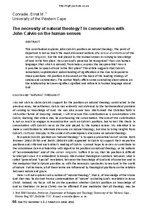The necessity of natural theology? In conversation with John Calvin on the human senses
Abstract
This contribution explores John Calvin's position on natural theology. The point of departure is not so much the much discussed notions of a sensus divinitatis or of the semen religionis, but the role played by the human senses in coming to knowledge of God in the first place. How can God's presence be recognised? How can human language (that which is natural), from below, express the inexpressible? How is it possible to speak of God in the first place? This article suggests that Calvin's remarkably sophisticated understanding of signification is the clue to respond to these questions. His position is discussed on the basis of the reading strategy of catena and commentary. The author finally offers some concluding observations on the relationship between signifier, signified and referent in human language about God.

